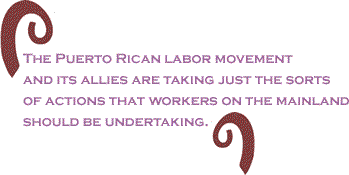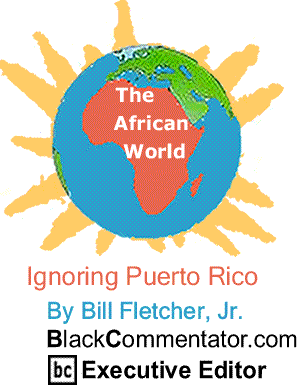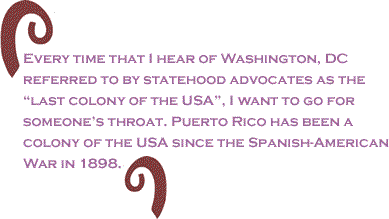
|
||||||||||||||||||||||
|
||||
 |
||||
The
mainstream news media in the To
put things into perspective, the population of On
one level there is nothing surprising here. Every time that I hear
of
During
most of the one hundred eleven years since the invasion of Puerto
Rico, it has received very little attention in the mainstream So, in one sense it is not surprising that little has been published or presented regarding the October 15th demonstrations. Despite the fact that Puerto Ricans are US citizens, developments on the island simply do not count in most mainstream US circles.
Yet the importance of these demonstrations cannot be overstated. In fact, the Puerto Rican labor movement and its allies are taking just the sorts of actions that workers on the mainland should be undertaking. In the face of draconian budget cuts, Puerto Rican workers have stood tall shaking the island to its core. Given the history of Puerto Rican worker militancy, it is unlikely that the Governor is assuming that the October 15th demonstrations are a one-shot deal.
We
should be paying more attention to BlackCommentator.com
Executive Editor, Bill Fletcher, Jr., is a Senior Scholar with the
Institute for Policy Studies,
the immediate past president of
TransAfrica Forum
and co-author of, Solidarity Divided: The Crisis in Organized Labor and a New Path
toward Social Justice |
||||
 |
||||
If you would like to comment on this article, please do so below. There is a 400 character limit. You do not need a FaceBook account. Your comment will be posted here on BC instantly. Thanks. Entering your email address is not mandatory. You may also choose to enter only your first name and your location.
|
||||
Thank you very much for your readership. |
||||
| Any BlackCommentator.com article may be re-printed so long as it is re-printed in its entirety and full credit given to the author and www.BlackCommentator.com. If the re-print is on the Internet we additionally request a link back to the original piece on our Website. | ||||
| |
||||
| November
19 , 2009 Issue 351 |
| Executive Editor: Bill Fletcher, Jr. |
| Managing Editor: Nancy Littlefield |
| Publisher: Peter Gamble |
| Est. April 5, 2002 |
| Printer Friendly Version in resizeable plain text format |
 |

|
 |
| |
| |














































